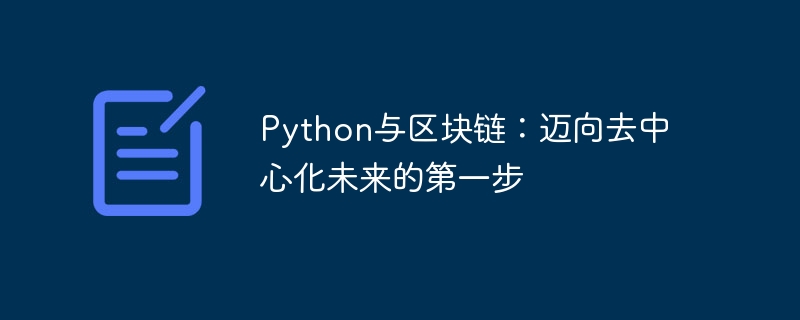Home >Backend Development >Python Tutorial >Python and Blockchain: The first step towards a decentralized future
Python and Blockchain: The first step towards a decentralized future
- WBOYWBOYWBOYWBOYWBOYWBOYWBOYWBOYWBOYWBOYWBOYWBOYWBforward
- 2024-03-17 09:10:031346browse

Smart contract development: python is one of the preferred languages for smart contract development. Its readability and versatility make it easy to create complex and secure smart contracts. Using Python, developers can easily define contract rules, specify trigger conditions and perform specific actions.
Blockchain interaction:Python provides a wide range of libraries and modules that enable developers to interact with various blockchainnetworks. For example, the WEB3.py library allows developers to connect to the Ethereum network, perform transactions and query the blockchain status.
Data analysis and visualization:Blockchain networks generate large amounts of data, requiring efficient data analysis tools. Python's data processing and visualization tools enable developers to easily analyze blockchain data, discover trends and create informative charts and visualizations.
dApp Development:Decentralized applications (dApps) are applications built on the blockchain. Python provides an ideal environment for developing dApps as it supports seamless interaction with blockchain networks and allows rapid prototyping.
Benefits and Advantages:
- Ease of use:
- Python is known for its readability and ease of use, allowing developers to quickly learn and get started. Versatility:
- Python is a multi-purpose language that supports a wide range of libraries and modules, making it suitable for a variety of blockchain application development. Community Support:
- Python has a large and active community that provides resources, tutorials, and support. Scalability:
- Python code is generally scalable and modular, allowing developers to easily handle complex and large blockchain projects. Security:
- Python provides a variety of security features, such as data type checking and exception handling, to help prevent security vulnerabilities.
- VeChain:
- A blockchain company focused on supply chain management, using Python to develop its smart contracts and dApps. Ethereum:
- The Ethereum Foundation adopts Python as one of its core development languages for EthereumVirtual Machine (EVM) and smart contract development. Chainlink:
- A company that provides blockchain oracles, using Python to develop its decentralized oracle network.
Python is a powerful tool towards a decentralized future. Its ease of use, versatility, and strong community support make it the language of choice for blockchain developers. By leveraging Python, developers can easily create smart contracts, interact with blockchain networks, analyze data, and build dApps to contribute to the decentralized future.
The above is the detailed content of Python and Blockchain: The first step towards a decentralized future. For more information, please follow other related articles on the PHP Chinese website!
Related articles
See more- Shock! The HTML5 Blockchain Game Alliance was established and a 1 billion development fund was established!
- How to implement blockchain development in PHP?
- Getting Started Guide to Blockchain Development (Go Language Edition)
- How to use Spring Boot to build blockchain applications and smart contracts
- Ethereum founder Buterin suggested increasing the Gas limit by 33% to enhance network throughput capacity

